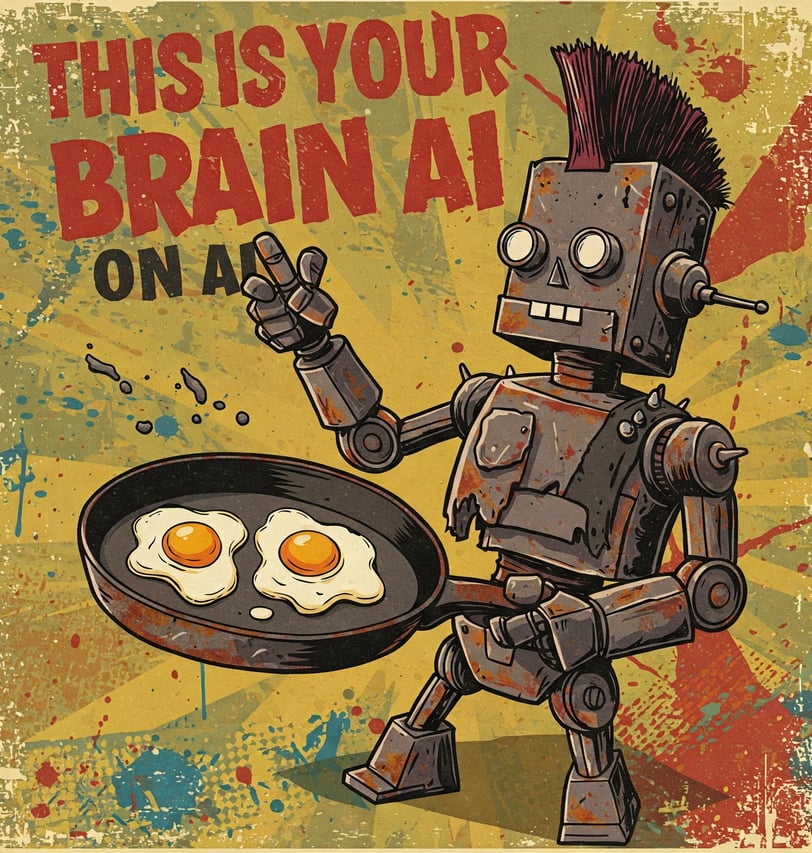This is Your Brain on AI
Empowering or Enervating? Parents have the power to position AI for good.
Greg Wallig
4/2/20252 min read


Empowering or Enervating?
Helpful advice for Parents Navigating the AI Revolution
Artificial intelligence (AI) is rapidly transforming our world, and its impact on our children's development is a topic of both excitement and concern. At Safeguarding the Future, we believe AI holds immense potential to empower young minds, fostering creativity and problem-solving skills. However, like any powerful tool, AI's influence can be detrimental if not wielded responsibly. We must ask ourselves: are we preparing our children to harness the power of AI, or are we inadvertently setting them up for intellectual atrophy?
Recent research, including a 2025 Microsoft-Carnegie Mellon study, suggests that the unguided use of AI tools can negatively impact critical thinking skills. As Lars Daniel points out in his related Forbes article, Your Brain On AI: ‘Atrophied And Unprepared’, over-reliance on AI for answers can lead to a decline in our ability to analyze information, form our own judgments, and solve problems independently. This echoes the findings of the "Prototype Study" discussed by Alex Knapp, also in Forbes (The Prototype: Study Suggests AI Tools Decrease Critical Thinking Skills), which indicates that AI tools, while helpful in generating solutions, can hinder the development of crucial thinking processes.
At Safeguarding the Future, we believe that AI should be a springboard for creativity and learning, not a crutch. We envision a future where children can use AI to augment their abilities, not replace them. This requires a shift in how we approach AI in education and at home. Instead of passively consuming AI-generated content, children should be actively engaging with the technology, using it to explore, experiment, and innovate. Generative AI technology is naturally interactive; it lends itself to this purpose. And, increasingly, technology companies are volunarily incorporating safety-by-design into their architectures, thanks in part to the work being promoted by organizations like Thorn.
So, how can parents ensure their children are benefiting from AI's potential while mitigating its risks? Here are some practical tips:
Encourage active learning: Don't let AI become a shortcut to answers. Encourage your children to research, analyze, and evaluate information before relying on AI-generated solutions. Ask them "how" and "why" questions, prompting them to think critically about the information they encounter.
Promote critical thinking: Use AI as a tool for discussion and debate. Challenge your children to question the information provided by AI, encouraging them to identify biases and inconsistencies. Ask them to consider different perspectives and form their own opinions.
Foster creativity: AI can be a powerful tool for creative expression. Encourage your children to use AI to explore different art forms, write stories, compose music, or design projects. Help them see AI as a tool for innovation and self-expression.
Set boundaries: Practice active supervision. Limit screen time and encourage offline activities. Ensure your children have ample opportunities to engage in physical activity, social interaction, and creative pursuits that don't involve technology.
Lead by example: Be mindful of your own use of AI and technology. Show your children that you value critical thinking, creativity, and independent problem-solving.
The AI revolution is upon us. It's our responsibility as parents and educators to equip our children with the skills they need to navigate this new landscape. By fostering critical thinking, promoting active learning, and encouraging creative exploration, we can ensure that AI empowers the next generation, rather than enervating it.
Where to Find Additional Research:
Academic Databases: JSTOR, ERIC, PsycINFO, IEEE Xplore
Research Institutions: MIT Media Lab, Stanford AI Lab, Carnegie Mellon Robotics Institute
Think Tanks: Pew Research Center, Brookings Institution
Government Organizations: National Science Foundation, Department of Education
